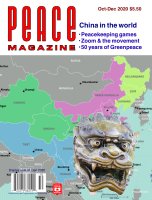
Peace Magazine Oct-Dec 2020, page 15. Some rights reserved.
Search for other articles by René Wadlow here
The 18 August 2020 coup by Malian military leaders brought an end to the unstable government of Ibrahim Boubacar Keita, widely known by his initials IBK. He had come to power on 22 March 2012 in another military coup which had ended the administration of President Amadou Trouré.
That 2012 coup had highlighted the weakness of the government structures and the narrow geographic base of the administration’s power. This realization led to a revolt in the north of the country led by two rival Tuareg groups as well as Islamist militias of non-Tuareg fighters coming from other Sahel countries and northern Nigeria. Mali was effectively divided into two roughly equal parts, each half about the size of France.
French troops from France were sent in January 2013 to prevent an expansion of the territory held by the Tuareg and the Islamists, but were not able to develop a stable administration. Mali had been poorly administered since its independence in 1960.
Economic development had been guided by political and ethnic considerations. During the French colonial period, from the 1890s to 1960, the French administration was based in Dakar, Senegal, a port on the Atlantic with secondary schools, a university, and an educated middle class.
Mali was considered an “outpost” (called French Sudan at the time) and largely governed by the French military more interested in keeping order than in development.
IBK’s administration was widely criticized by much of the population for its incompetence, favoritism, and corruption, especially by family members such as his son Karim Keita. Islamist groups remained powerful in parts of the north and central Mali. The whole Sahel area, in particular the frontier area of Mali, Niger, and Burkina Faso, still has powerful and violent Islamist militias. This instability is an increasing menace to the coastal countries of Togo, Benin and Cote d’Ivoire.
Over the past year, discontent with IBK has led to a loose coalition of opposition groups known by the title M5 -RFP, of which the conservative imam Mahmoudi Dicko is a leading figure.
For the moment, the Mali military leaders have formed the Comité national pour le salut du peuple (the national committee for the salvation of the people). It is led by Col. Assimi Gaita, a special forces leader. The Committee has said it is forming a military-civil transitional government that will lead to elections in nine months.
The challenges facing Mali and the wider Sahel area are great, in large measure linked to the lack of socio-economic development, economic stagnation, and poor administration. The situation is made worse by the consequences of global warming and persistent drought. The military are not trained to be development workers. A broad cooperative effort of all sectors of the population is needed. Will the military be able to develop such a broadly-based cooperative effort? Mali and the Sahel merit close attention.
René Wadlow is president, Association of Global Citizens.

Peace Magazine Oct-Dec 2020, page 15. Some rights reserved.
Search for other articles by René Wadlow here